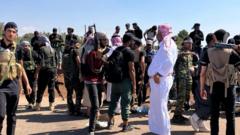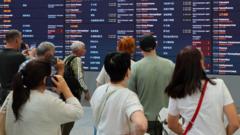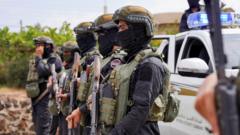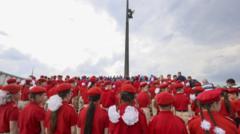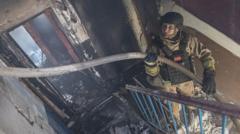In the latest round of peace discussions in Istanbul, both nations remain entrenched in their positions, with significant challenges ahead.
**Russia-Ukraine Talks Fail to Secure Ceasefire Amid Plans for POW Swap**
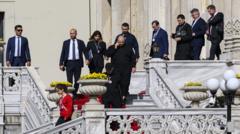
**Russia-Ukraine Talks Fail to Secure Ceasefire Amid Plans for POW Swap**
Negotiations between Russia and Ukraine conclude without a ceasefire agreement, although a prisoner exchange is on the horizon.
In a tense meeting held in Istanbul, representatives from Russia and Ukraine concluded their second round of peace talks, once again failing to agree on an unconditional ceasefire, a critical demand from Ukraine and its allies. Despite the setbacks, both sides made a commitment to facilitate the exchange of prisoners of war, including the returning of 12,000 soldier bodies.
Ukrainian negotiators expressed frustration over Russia's consistent refusal to accept a total ceasefire, crucial for discussions aimed at ending the conflict that began with Russia’s invasion of Ukraine in February 2022. Currently, Russian forces control approximately 20% of Ukraine, including Crimea, which they annexed in 2014.
Turkish officials facilitated the meeting, which lasted just over an hour. Ukraine’s Defense Minister Rustem Umerov reiterated the need for a comprehensive ceasefire lasting at least 30 days to prevent further loss of life. He indicated that Ukraine had previously submitted its proposals to Russia, but in Istanbul, Russia brought forward its terms, including a limited truce proposal for only a few days.
Ukrainian President Volodymyr Zelensky criticized the temporary ceasefire suggested by Russia, stating the primary goal of a ceasefire is to prevent more casualties. Details of both nations’ proposals have not been publicly disclosed; however, Russian media reported key points from Moscow’s stance. These reportedly include demands for Ukrainian military withdrawal from occupied regions and provisions restricting Ukraine’s military alliances and recognizing Russian as an official language.
Further complicating matters, Ukraine raised allegations regarding hundreds of children it claims have been abducted and sent to Russia. Ukrainian officials are awaiting a response from Moscow regarding their proposals while signalling the importance of future direct dialogues between President Zelensky and President Putin.
Russian delegation head Vladimir Medinsky confirmed that discussions will lead to the exchange of sick and heavily wounded soldiers under specific conditions, without providing a timeline. He noted that Russia plans to transfer the remains of 6,000 Ukrainian soldiers back to Kyiv. Zelensky also announced a reciprocal agreement for the return of Russian soldier remains but did not clarify the timing of this exchange.
While the latest discussions marked another impasse, Zelensky emphasized Ukraine's need to bolster its defense until there are tangible signs from Russia that peace is possible. Given the ongoing conflict and the stalled negotiations, both presidents' willingness to meet and discuss a possible resolution remains uncertain. Calls for additional sanctions against Russia are echoed by leaders worldwide, underscoring the complex international landscape surrounding this protracted conflict.
Ukrainian negotiators expressed frustration over Russia's consistent refusal to accept a total ceasefire, crucial for discussions aimed at ending the conflict that began with Russia’s invasion of Ukraine in February 2022. Currently, Russian forces control approximately 20% of Ukraine, including Crimea, which they annexed in 2014.
Turkish officials facilitated the meeting, which lasted just over an hour. Ukraine’s Defense Minister Rustem Umerov reiterated the need for a comprehensive ceasefire lasting at least 30 days to prevent further loss of life. He indicated that Ukraine had previously submitted its proposals to Russia, but in Istanbul, Russia brought forward its terms, including a limited truce proposal for only a few days.
Ukrainian President Volodymyr Zelensky criticized the temporary ceasefire suggested by Russia, stating the primary goal of a ceasefire is to prevent more casualties. Details of both nations’ proposals have not been publicly disclosed; however, Russian media reported key points from Moscow’s stance. These reportedly include demands for Ukrainian military withdrawal from occupied regions and provisions restricting Ukraine’s military alliances and recognizing Russian as an official language.
Further complicating matters, Ukraine raised allegations regarding hundreds of children it claims have been abducted and sent to Russia. Ukrainian officials are awaiting a response from Moscow regarding their proposals while signalling the importance of future direct dialogues between President Zelensky and President Putin.
Russian delegation head Vladimir Medinsky confirmed that discussions will lead to the exchange of sick and heavily wounded soldiers under specific conditions, without providing a timeline. He noted that Russia plans to transfer the remains of 6,000 Ukrainian soldiers back to Kyiv. Zelensky also announced a reciprocal agreement for the return of Russian soldier remains but did not clarify the timing of this exchange.
While the latest discussions marked another impasse, Zelensky emphasized Ukraine's need to bolster its defense until there are tangible signs from Russia that peace is possible. Given the ongoing conflict and the stalled negotiations, both presidents' willingness to meet and discuss a possible resolution remains uncertain. Calls for additional sanctions against Russia are echoed by leaders worldwide, underscoring the complex international landscape surrounding this protracted conflict.






